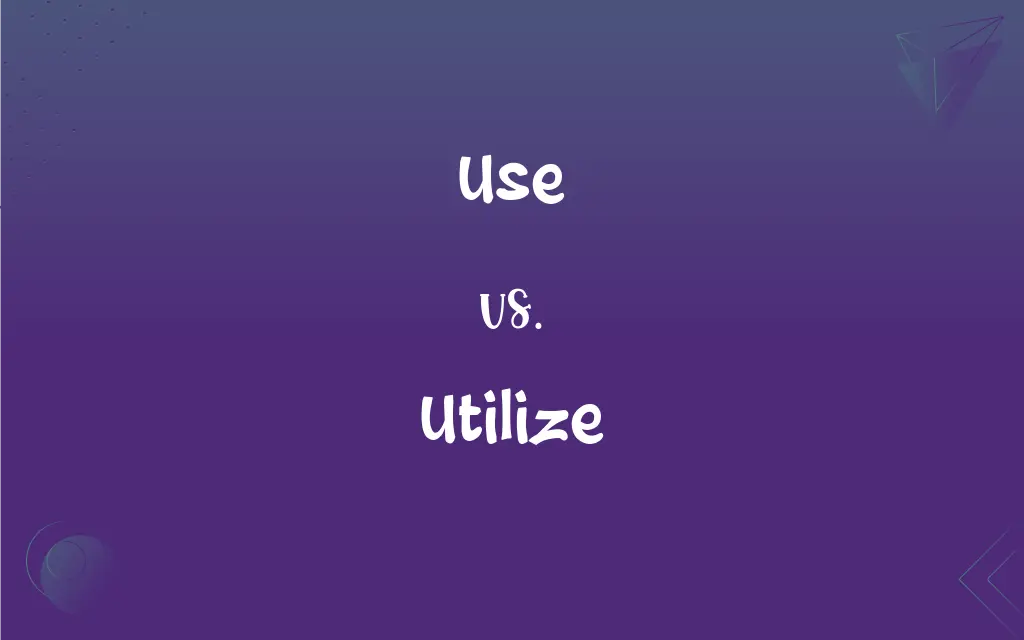Use vs. Utilize: What's the Difference?
By Janet White || Published on December 25, 2023
"Use" means to employ for a purpose; "utilize" implies making the most effective use of something, often something not originally intended for that purpose.

Key Differences
"Use" refers to the act of employing any object or concept for its intended or typical purpose, whereas "utilize" often implies a more strategic or creative application, especially of something not conventionally used for that purpose.
The term "use" is more general and common in everyday language, suitable for most contexts where something is employed or applied. In contrast, "utilize" suggests an element of resourcefulness, often turning something to one's advantage or applying it in an innovative way.
"Use" is a straightforward expression, implying the practical application of an item, tool, or knowledge. "Utilize", however, often connotes a sense of maximizing efficiency or effectiveness, especially in a novel or unconventional manner.
The word "use" is versatile, fitting into a wide range of contexts from casual to technical. "Utilize", on the other hand, is more likely to appear in formal or technical writing, suggesting a deliberate and thoughtful application.
"Use" can be applied in a broader sense, not just limited to physical objects but also to abstract concepts. "Utilize" typically refers to a more specific and calculated application, often in the context of achieving a particular goal or solving a specific problem.
ADVERTISEMENT
Comparison Chart
Definition
Employ something for a purpose
Make effective use of something
Connotation
General and straightforward
Strategic or creative application
Typical Context
Everyday, casual, broad range
Formal, technical, specific
Application Scope
Broad and varied
More focused and deliberate
Implication
Simple employment of resources
Maximizing efficiency or value
ADVERTISEMENT
Use and Utilize Definitions
Use
To consume or expend.
They use electricity for heating.
Utilize
To make use of; turn to use.
They utilize solar energy to power the building.
Use
To treat or behave toward.
He used his friends unfairly.
Utilize
To employ for a specific purpose.
She utilized her experience in her new job.
Use
To take advantage of.
She used the opportunity to learn.
Utilize
To convert to use.
The company utilizes waste materials in production.
Use
To employ for some purpose.
She will use a map to navigate the city.
Utilize
To make practical and effective use of.
He utilized his network to find a job.
Use
To avail oneself of.
He uses his skills to earn a living.
Utilize
To apply resourcefully or creatively.
She utilized her skills to solve complex problems.
Use
To put into service or employ for a purpose
I used a whisk to beat the eggs. The song uses only three chords.
Utilize
To put to use, especially to make profitable or effective use of
An approach to the problem that utilizes the latest research.
How plants utilize nutrients to produce seeds.
Use
To avail oneself of; practice
Use caution.
FAQs
Can "use" and "utilize" be used interchangeably?
They can sometimes be used interchangeably, but "utilize" often implies a more strategic application.
How is "utilize" defined?
"Utilize" means to make effective or creative use of something, often in a way not originally intended.
Does "use" have a broader application than "utilize"?
Yes, "use" is more versatile and can apply to a broader range of contexts.
Can "use" refer to abstract concepts?
Yes, "use" can refer to both physical objects and abstract ideas or practices.
Is "utilize" more formal than "use"?
Yes, "utilize" is typically more formal and often used in technical or professional contexts.
What does "use" mean?
"Use" means to employ something for a specific purpose, typically its intended function.
Is "utilize" a better choice for technical writing?
"Utilize" is often preferred in technical writing for its connotation of efficiency and effectiveness.
Can "utilize" be overused or misused in writing?
Yes, "utilize" is sometimes overused in attempts to sound more formal or technical.
Is "use" more common in everyday language?
Yes, "use" is more common and versatile in everyday speech and writing.
Does "utilize" imply innovation?
"Utilize" can imply innovation, especially when applying something in an unconventional way.
Can "use" imply taking advantage of someone?
Yes, "use" can also mean to take advantage of someone or something.
Is "utilize" always a more appropriate choice?
Not always. "Utilize" is best used when indicating strategic or creative application.
Can "utilize" imply a transformation of function?
Yes, it often implies adapting something for a new or unexpected use.
Are there situations where "utilize" should be avoided?
"Utilize" should be avoided when a simpler "use" is more direct and to the point.
Does "use" have a negative connotation?
"Use" can have a negative connotation in certain contexts, like exploiting someone.
Is "utilize" suitable for academic writing?
"Utilize" can be suitable in academic writing, particularly in scientific or technical contexts.
Can "use" be used in a formal context?
Yes, "use" can be appropriate even in formal contexts.
Should "use" be preferred for simplicity?
Yes, "use" is often preferred for clarity and simplicity in communication.
Does "utilize" imply a more careful or considered application?
Yes, "utilize" suggests a more deliberate and thoughtful application.
Can the misuse of "utilize" affect the clarity of writing?
Yes, inappropriate use of "utilize" can make writing seem pretentious or unclear.
About Author
Written by
Janet WhiteJanet White has been an esteemed writer and blogger for Difference Wiki. Holding a Master's degree in Science and Medical Journalism from the prestigious Boston University, she has consistently demonstrated her expertise and passion for her field. When she's not immersed in her work, Janet relishes her time exercising, delving into a good book, and cherishing moments with friends and family.







































































